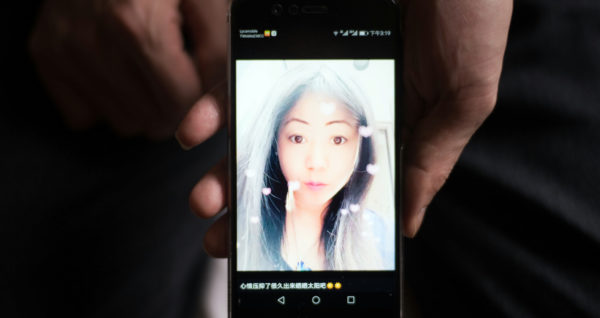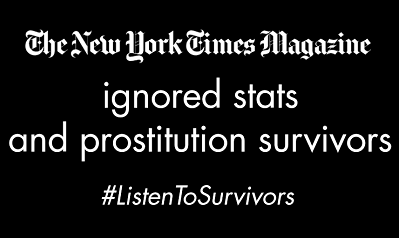Last weekend, the New York Times Magazine’s cover feature asked the question: “Should Prostitution Be a Crime?”
The article courted controversy and failed to include the viewpoints of survivors, activists and service providers who know firsthand the deep harm and gender inequality perpetuated by the commercial sex industry.
Today, the Times published letters in response to the article. Here are a few letters that didn’t make the LTE page, among them critically important perspectives from survivors that were left out:
To the Editor:
Re: Should Prostitution be a Crime?
If the small group of privileged “sex workers” highlighted in Bazelon’s article have their way, and prostitution is decriminalized around the world, every boy will grow up knowing it¹s acceptable to buy a body whenever he feels the urge. The result? The market for flesh will grow, delivering a windfall to traffickers and pimps and putting millions more women and girls in harm’s way. The standard PR line of the commercial sex industry is that we in the anti-trafficking community “conflate” consensual prostitution with trafficking. No, we don’t. Prostitution is the marketplace and trafficking is a primary way that product is delivered to buyers. It’s economics 101. Grow the market and trafficking increases.
Bazelon blithely disregards the harm inherent in prostitution. I’ve seen it up close, having been Director of the Human Rights Clinic at Mount Sinai. The stories from survivors of the sex trade are horrific. The violence in prostitution is staggering. The resulting physical and mental health problems are crushing. We need to adopt the Nordic model, which decriminalizes the prostituted person but criminalizes the traffickers, pimps and buyers. Creating an open market place for the use and abuse of women and girls (and men and boys) would be one of the most shocking human rights violations of our time.
Holly G. Atkinson, MD, FACP, FAMWA
Co-Director, Physicians Against the Trafficking of Humans,
American Medical Women’s Association
Past President, Physicians for Human Rights
To The Editor:
We are writing in response Emily Bazelon’s Should Prostitution Be A Crime? We are young, feminist and proud of our sexuality yet horrified by society’s continued commodification of it. As a community of dedicated high school activists who work alongside teen survivors of the sex trade, we have seen first hand the damaging, lifelong impact of commercial sexual exploitation.
Our generation wants progress, yet Amnesty and others respond with laziness. We want to move forward toward gender equality, well, the decriminalizing of pimping and buying would only push us back. Legitimizing the “oldest profession”–a profession of the patriarchy–is not progress, it’s giving up. We’d like “human rights” organizations and journalists to stop trying to selling us on the selling of our bodies. Instead of “regulating” oppression and passing it off as a “profession,” be the leaders we deserve, and end it!
Sincerely,
The members of The Arts Effect All-Girl Theater Company
To the Editor,
Since 1990, I have worked with thousands of prostituted women and girls. Unlike the woman highlighted in the photo spread of “Should Prostitution Be Legal” (May 5, 2016), the vast majority of people I have worked with have been African American women and girls and have stated that if they had any choice but prostitution, they would leave “the life” immediately.
In prostitution, purchasers don’t care about the pleasure or pain of the purchased. She exists as a hand, mouth, genitals, anus – not a human being. Sex buyers pay for the right to direct her to do whatever brings him to orgasm, no matter how humiliating the act. She is paid to play out the fantasy that she has power. In reality, she has none.
We can and should remove penalties imposed on people in prostitution, while implementing laws that hold pimps and buyers accountable. The women used in prostitution deserve our support, but we cannot continue to tolerate or promote this exploitive institution.
Vednita Carter
Founder and President, Breaking Free
Minneapolis, Minn
Re: the New York Times Magazine cover story Should Prostitution Be a Crime.
As a former judge and prosecutor, and now as the executive director of Sanctuary for Families, I have seen thousands of victims who have been exploited in the sex trade. Many of them were lured in by pimps and traffickers, most as children. Others have ended up in prostitution when conditions of extreme poverty and prior sexual abuse leave them with few options.
Ms. Bazelon inexplicably omits the experience of these victims, almost exclusively women and girls of color and undocumented immigrants. Instead, her primary focus is on the comparatively privileged, adult, mostly white “sex worker” as reflected in the cover photo, which creates a falsely benign picture of the world’s most brutal industry.
Prostitution is almost invariably a condition of gender inequality and frequently a violent and lethally dangerous form of abuse inextricably connected to sex trafficking. People in prostitution should not be criminalized and must be provided with services. If we fail to hold traffickers, pimps and buyers accountable, the sex trafficking industry will continue to expand, destroying the lives of new generations of victims.
Hon. Judy Harris Kluger
Executive Director
Sanctuary for Families
To the Editor:
Re: Should Prostitution be a Crime?
Emily Bazelon ‘s piece ““Should Prostitution Be a Crime?” makes a case for listening to the voices of those who have actually experienced the commercial sex industry. Unfortunately the voices left out of this piece are the women and girls who have not viewed this as ‘sex work’ but violent exploitation, the experiences of those under pimp control, (over 90 percent of the 400 plus girls and young women GEMS serves annually are or have been under the control of a pimp) and the hundreds of women who have now begun to step out of the shadows to publicly identify as ‘survivors’ of commercial sexual exploitation and trafficking.
These voices are overwhelmingly the voices of girls and young women of color, (the slide show is clearly overwhelmingly white women), of runaway and homeless youth, of women trapped in addiction and poverty. While the anti-trafficking movement can often over simplify or sensationalize these stories, the truth is both more nuanced and more horrific than any well-intentioned awareness campaign that isn’t survivor led or survivor informed.
As a survivor myself and having founded and run GEMS for 18 years, I’m aware that there are no easy solutions to this issue but at least the NYT could have provided a more balanced view by actually including the voices of those young people who are already marginalized and who view the sex industry as inherently violent and harmful, preying upon the most vulnerable in our society.
Rachel Lloyd
Founder and CEO
Girls Educational and Mentoring Services
To the Editors of The NY Times;
I am writing in response to Emily Blazelon piece “Should prostitution be a crime?” As a survivor of exploitation and a front line worker, I was disheartened at this one-sided piece.
I have worked with hundreds of women and girls caught up in the vicious cycle of indignity, pain and hurt. 82% of prostituted women have experienced childhood traumas, sexual abuse, neglect, physical abuse,poverty. Many survivors sell sex and out of desperation label it “choice.” But to have “choice”, you must have options. Most of these women and girls do not.
In Canada, 51% of trafficked women and girls in Canada are Indigenous, like me. Many are lured into the sex trade as young children. The age is even younger if the parent is in prostitution.
If Ms. Bazelon thinks that prostitution is legitimate “work” then she should put down her pen and give prostitution a try. I bet after she learned the real truths about the disgusting men who feel privileged to buy sex, the next article she wrote would directly contradict this one.
Sincerely,
Bridget Perrier
Survivor
Co-Founder/First Nations Educator
Sextrade101
www.sextrade101.com
To the Editor:
Contrary to Emily Bazelon’s claim in NYT Magazine (5/8), there was ample “recorded data on street prostitution” before Sweden’s criminalization of buyers and decriminalizing of prostituted persons. The decline is actually by more that 50% since 1999 — not just “as much as 50%” — and it is well documented by several independent sources.
Moreover, she omits that while online prostitution ads increased in Sweden, they increased much more in neighboring countries alongside increasing street prostitution, leading researchers around 2007 to estimate numbers of prostituted women as about 15 times higher per capita in Denmark and 9 times higher per capita in Norway compared to Sweden.
Compared to the rest of Europe, sex trafficking almost never happens in Sweden anymore. Bazelon focuses only on the law’s critics, ignoring prostituted women who have explained how the law empowered them to report buyers treating them badly, and who reject her claim that prostitution became more dangerous. She also omits research showing how legal brothels tacitly permit unsafe and dangerous sex since buyers have the upper hand and often want sex that others refuse them, while prostituted persons overwhelmingly have no other options.
Max Waltman
Assistant Professor, Political Science, Stockholm University, Sweden

